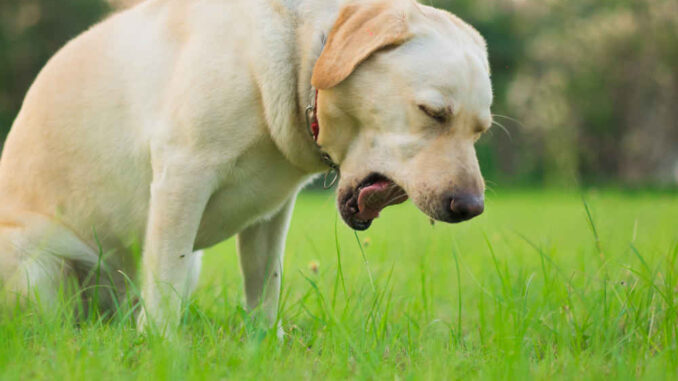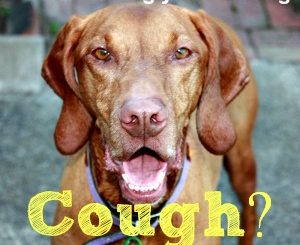
This article was updated on November 19th, 2023
Your dog has started to cough repeatedly – it’s usually a sign that your dog is suffering from a serious medical condition. Medical tests are likely required to confirm the right diagnosis, but answers to the following questions can set your veterinarian on the right path:
- Is it a dry cough or a wet cough, i.e. does your dog bring anything up when they cough?
- Is your dog also showing other signs of illness, such as breathing issues, lack of appetite, or lack of energy?
- How old is your dog?
The answers to these questions will help your veterinarian figure out the most likely causes, the medical tests to confirm diagnosis & what to do to help your dog.
Answer These Questions to get Personalized Information:
You can answer the questions above to get personalized information from our veterinarian team, or keep reading to learn about the most likely reasons causing your dog to cough – and what you can do about it now.
Why Your Dog is Coughing: 7 Most Likely Reasons
If Your Dog is Coughing but Generally Feeling Well (71.6% of cases):
Is your dog coughing but otherwise still full of energy and eating as normal? You are not the only one: in 71.6% of cases (according to our survey of 1,820 owners with coughing dogs), coughing dogs do NOT show other obvious signs of illness such as lack of appetite, lack of energy or difficulties breathing.
The most common causes of a cough in a dog that is otherwise feeling well include:
1. Kennel cough / respiratory infection
What it looks like:
✓ Dry “honking” cough
✓ Some dogs still have high energy
✓ Some dogs still eat normally
Infectious respiratory diseases, including viruses and bacterial causes such as “kennel cough,” are extremely common. Like kids in daycare or school, these respiratory diseases are often diagnosed in dogs that have been around other dogs. Many healthy dogs will develop a dry, “honking” cough with these illnesses but will still have good energy and be eating and drinking well. Some dogs will show other symptoms such as a runny nose, lethargy, and loss of appetite.
This is what Kennel Cough Sounds like (watch the video):
Treatment: These mild upper respiratory infections may be treated with antibiotics (if bacterial) or medications may be given just to ease clinical signs. Dogs may require anti-inflammatories, cough suppressants, or expectorants. Make sure you talk to your veterinarian to discuss treatments. Learn more: How is Kennel Cough Treated?
2. Collapsing Trachea
What it looks like:
✓ Dry coughing (often triggered by excitement or eating)
✓ Some dogs will have difficulty breathing
✓ Very common in small breed dogs
Collapsing trachea is very common in small breed dogs who have small tracheas and less rigid tracheal ring cartilage. Episodes of tracheal collapse may be triggered by excitement, exercise, eating and drinking, or allergens in the air such as pollen and smoke. When the dog inhales deeply, the trachea collapses and causes the dog to cough and gag. Some dogs will show other symptoms such as difficulty breathing, wheezing, gagging, or retching. A collapsing trachea can often be seen on chest x-rays.
Treatment: Treating a collapsing trachea involves weight loss, anti-inflammatories, allergy medications, and other interventions as necessary. Keeping the dog at an appropriate weight and away from irritants will also help.
3. Allergies/Asthma
What it looks like:
✓ Dry coughing
✓ Runny eyes or nose
✓ Licking paws or scratching
Though not very common in dogs, a dry cough in an otherwise healthy animal may be the result of allergies or asthma. Your veterinarian will likely take chest x-rays and ask for a thorough history to determine if this is the cause of your dog’s coughing. Being able to explain when your dog coughs will be helpful for your veterinarian.
Treatment: Treatment consists of allergy medications, anti-inflammatories, and bronchodilators. With an exam, chest x-rays, and medications, the initial visit is likely to cost between $200-$500.
If Your Dog is Coughing AND Shows Signs of Illness:
If your dog is repeatedly coughing and also feeling unwell or showing other signs of illness, it is time for a visit to the veterinarian. Let’s look at what could be causing your dog’s ailments. In almost 30% of cases, coughing dogs also showed other signs of illness including lack of energy, lack of appetite, or difficulty breathing.
These symptoms can give important clues on what could be causing your dog’s coughing and what to do. The most common causes of coughing in dogs that are also showing other signs of illness include:
4. Heartworm Disease.
What it looks like:
✓ Mild dry cough
✓ Lack of energy
✓ Lack of appetite
Treatment: Heartworm disease in dogs is caused by Dirofilaria immitis, which are worms that are carried and transmitted by mosquitoes. Heartworm disease, if left untreated, may be fatal. Unfortunately, there is often extensive heart and lung damage before any clinical signs are seen. All dogs should receive heartworm prevention in accordance with their veterinarian’s guidance, as well as a heartworm test annually.
5. Heart Disease
What it looks like:
✓ Dry or wet coughing
✓ Coughing after getting up
✓ Difficulty breathing / gasping
✓ Getting tired quickly or not feeling well
In dogs, the most common type of heart disease we see is dilated cardiomyopathy. This heart condition results in a “stretched out,” flabby heart that loses the ability to contract properly. This leads to sluggish blood flow and fluid buildup in the lungs and abdomen.
Dogs with heart disease often cough first thing in the morning or after getting up from lying down. This is due to the fluid pooling in the lungs. It can be difficult to ascertain if the cough is “dry” or “wet” from simply hearing the dog cough. Poor oxygenation and difficulty breathing may lead to the dog not feeling well. At this point, the dog is in congestive heart failure, and it is an emergency.
This is an example of coughing due to heart disease (watch the video):
Treatments: There are treatments available to help ease congestive heart failure; however, it cannot be cured. Depending on the severity of the condition when diagnosed, costs may range from a few hundred dollars to thousands. Learn more with our article about Older Dog Heart Issues: An Owner’s Guide.
6. Pneumonia
What it looks like:
✓ Dry or wet coughing
✓ Not feeling well and often ill
✓ Fever (read: how to tell if your dog has a fever)
Caused by bacteria, viruses, or fungal organisms, dogs with pneumonia are systemically ill. Though many cases of pneumonia exhibit more of a “wet” cough, it can be difficult to determine by just listening to the dog cough.
This is an example of coughing due to Pneumonia:
Treatment: If left untreated, the condition may become fatal. Pneumonia is treated with hospitalization, medications to treat the infection, medications to lower fever and ease pain, and intravenous fluids to correct dehydration. The cost of medical care for a dog with pneumonia is highly variable and depends on the cause, the severity, and the length of hospital stay.
7. Cancer spreading to the lungs
What it looks like:
✓ Dry or wet coughing
✓ Slightly increased respiratory effort or rate
Sadly, cancer is very common in dogs, with 50% of older dogs developing the disease. A wet cough in a sick dog may indicate a primary lung cancer or the presence of metastasis from a cancer located elsewhere in the body that has spread to the lungs. Typical early clinical signs may be only slightly increased respiratory effort or rate and a cough.
Other Reasons Causing Dogs to Cough
We have outlined above the most frequent reasons causing coughing in dogs. However, there could also be other reasons, including:
- Distemper
- Asthma
- Foreign body stuck in throat or esophagus
- Acid reflux
- Valley Fever (a fungal infection)
- Allergies
When Is Coughing Serious Enough to See Your Vet?
You might be wondering if your dog’s cough or gagging is serious enough to justify a visit to your veterinarian. It can be hard to know as an owner when a cough is serious enough to warrant veterinary attention.
A dog may occasionally cough to clear their throat or if something irritates them. That’s usually not a cause for concern. However veterinary attention is likely required if a cough:
- becomes persistent,
- lasts more than 2 days, or
- becomes more frequent or severe
Additionally, a cough is always serious if it comes with breathing difficulties, if your dog is generally unwell in themselves or if they are coughing up large amounts of phlegm or blood.
As a general rule, it may be ok to just monitor your dog’s cough at home, if your dog is still:
- bright in themselves and
- eating and drinking as normal
Since coughing can be a symptom of a serious ailment, it’s important to be cautious and take your dog to the veterinarian if you are unsure about what to do.
What Will the Vet Ask You
It’s important to be prepared for the basic questions your vet will want to ask about your old dog’s coughing or gagging. Being able to answer your vet’s questions will help improve diagnosis and ultimately solve the issue faster for your canine friend. Questions may include:
- How can you describe the cough? (choking, gagging, retching, gasping or throat clearing noise, etc?) – it may not even be a cough at all!
- Is the cough productive – i.e. does your dog bring anything up when they cough?
- Are there any other signs associated with the cough such as breathing issues or lack of appetite
- How frequent is the cough? Is coughing on a daily basis, several times per day?
- How long has coughing been going on?
- Does the cough appear to come more from the throat or chest?
- Does anything trigger the cough? Or does it happen in a specific environment?
How Will Your Vet Diagnose the Issue?
Your vet will start by taking a thorough history (see how to prepare for the visit below) and by performing a physical examination on your dog. They will pay particular attention to any abnormal heart or breathing sounds, the heart rate and rhythm and your dogs temperature. By using all of this information, they will then decide the best next course of action.
Sometimes your vet may opt to start a trial treatment plan and base the diagnosis on the response to medication. For example, in the case of kennel cough, anti-inflammatory medication is often all that is required and if your dog responds well then it’s likely that kennel cough was the cause.
However, if a heart murmur or abnormal heart rhythm is detected then a heart ultrasound scan and X-rays might be the next step. This will help evaluate whether or not your dog’s heart has signs of congestive heart failure such as thickening of the heart walls, inefficient heart valves or fluid build up within the lungs.
X-rays are a key tool in evaluating any dog that has developed a persistent cough. By taking an X-ray of your dogs chest and lungs, vets will be able to visualise the distribution of air within the lungs. A healthy dogs lungs should appear dark on an X-ray as they are full of air; the presence of any lighter coloured areas may indicate thickening within the lungs or even fluid build up. There are many different ‘lung patterns’ that can be identified on an X-ray that can point towards a specific diagnosis.
Disclaimer: This website's content is not a substitute for veterinary care. Always consult with your veterinarian for healthcare decisions. Read More.






Be the first to comment